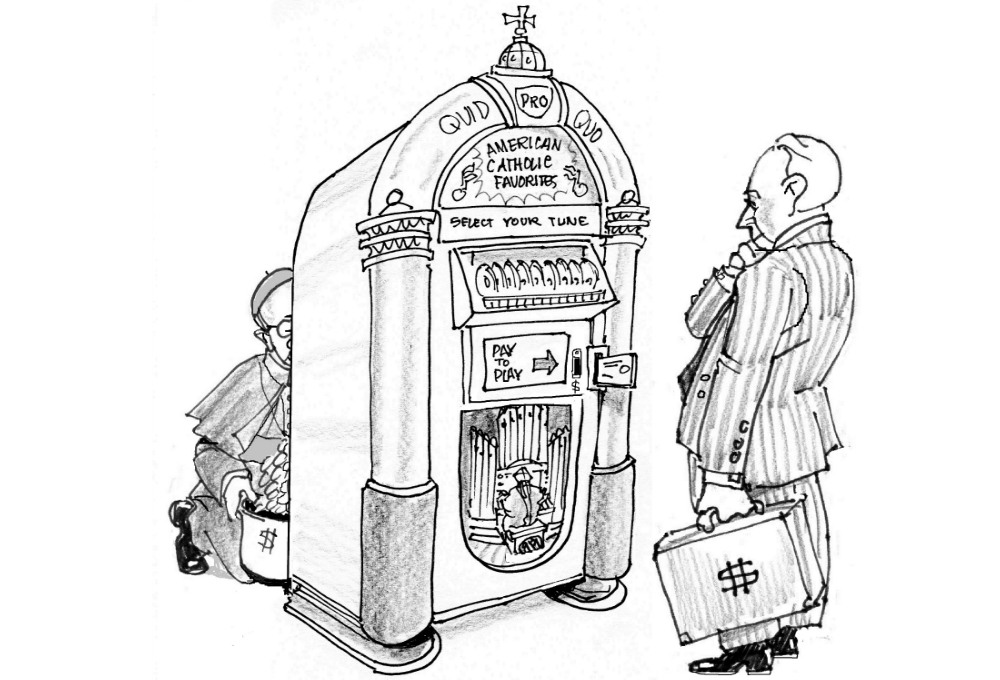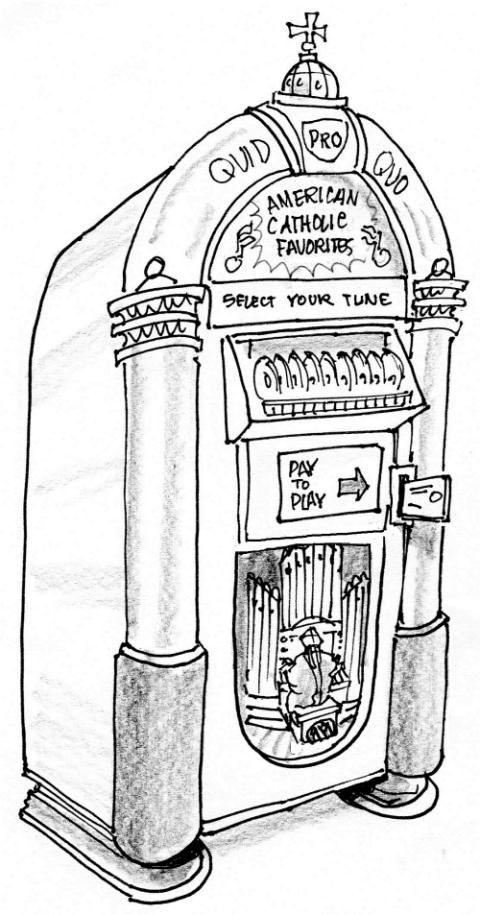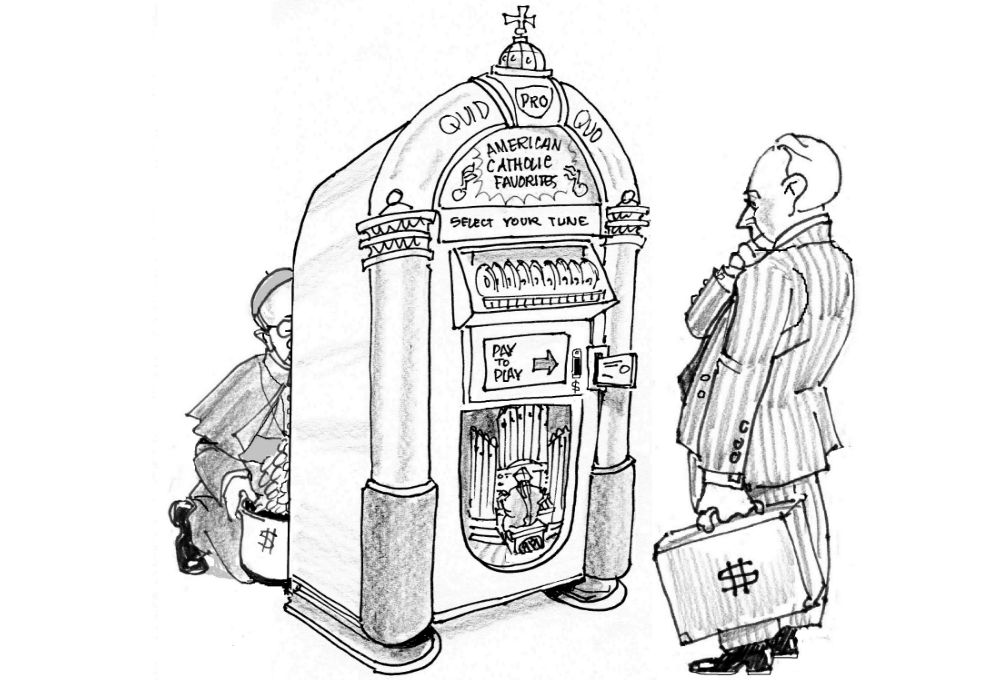
The Catholic Church in the United States is for sale.
In quiet investments over a period of decades, wealthy entrepreneurs and flush nonprofits have supplanted elements of church life that once were the province of official church organizations. Church leaders have watched as individuals and groups with substantial resources became the voice of the church in the public square, fashioning a Catholic narrative for the wider culture.
Collectively, the efforts of the new ecclesial entrepreneurs have resulted in structures, many of them on the right to extreme right of the spectrum, that challenge the authority and the voice of the U.S. bishops. In some recent examples, influential individuals and groups have also embraced and amplified the most acerbic critics of Pope Francis.
Most of this development has occurred through the nonprofit sector, a peculiarly American phenomenon that has exploded during the past half century in terms of numbers of organizations, the amount of money they're able to attract, and the political influence they now exert both within and outside the church.
Our coverage on this began five years ago with reporting on a Napa Institute conference. More recently, NCR tracked the growth of money and its influence on Catholic life beginning with an extensive look at the considerable amounts the Knights of Columbus has donated to think tanks, news organizations and the generous grants it has made to church leaders and projects that conform to a conservative political ideology. Through detailed investigation and analysis of public tax documents and reporting on events, NCR has demonstrated that such spending provides individuals and other organizations entrée to the highest levels of church leadership and affords others an inordinately large say in church affairs.
Outlets like EWTN, the Ethics and Public Policy Center, First Things, the right-wing Federalist Society (a kind of scouting organization for conservative jurists), the Becket Fund for Religious Liberty and the libertarian Acton Institute were beneficiaries of funding from the Knights and other wealthy Catholics who have successfully constructed a Catholic story for public consumption. The story is uncomplicated, sectarian, defined by the binary choices of the ongoing culture wars and a sanctified version of libertarian economics that comes dressed in gaudy Catholic attire.
It is a purely American concoction. The attire is a tawdry knockoff of the real thing. The narrative is an embarrassment when viewed against our sacred texts and the richness of the Catholic social justice tradition.
What we are witnessing is not the result of a program, at least none openly stated or described. It is, rather, the result of opportunity cleverly and creatively exploited. And the bishops themselves, especially those violative of the community's trust during the past 30-40 years, are most to blame for providing the opportunity.
Advertisement
We say up front that what is being done is neither illegal nor immoral. There is nothing inherently wrong with someone who backs up strong convictions with money. People with significant resources are often the means to survival for those of us in the nonprofit 501(c)(3) world. After all, Vatican II called for laity to bring the church into the world.
But our reporting details something quite extraordinary that has been developing for decades, made possible by the nonprofit mechanism in the United States and by the leadership vacuum that now exists in the U.S. episcopacy.
Several forces created that vacuum. The first was a document issued personally by Pope John Paul II in 1998. Titled Apostolos Suos, it was aimed at severely reining in the authority and teaching role of episcopal conferences.
Another is the ongoing clergy sexual abuse scandal. It has become a global scandal in which bishops the world over engaged in systematic cover-up of horrendous abuse of children and young people. As old patterns of abuse and cover-up continue to be revealed, it has drained the credibility of the bishops as a group.

(NCR illustration/Pat Marrin)
A lack of leadership was also baked into the character of bishops appointed during the 35-year span of the papacies of John Paul II and Benedict XVI. It became clear shortly after John Paul was elected in 1978, as the Congregation for the Doctrine of the Faith under him hauled in a string of distinguished theologians for disciplining and silencing, that his preferred candidates for the episcopacy would be submissive, devoid of questions or the slightest challenge to authority. Decades of appointments of men who generally conformed to those preferences and resisted anything that could be construed as dissent resulted in a conference acquiescent to Rome's every wish.
With the Vatican exerting unprecedented control over the American bishops, the conference turned inward, its meetings dominated by long discussions about liturgy, the language of prayers and promulgation of loyalty oaths for church workers and theologians. The conference had lost its voice and its place as an actor in the larger society.
Who has stepped into the breach as the primary conveyers of this uniquely American version of Catholicism?
Mostly powerful men, no doubt well-intended in their love for the church and their particular vision of how it should look and function. Access to wealth is the common bond. A sampling of the most recognizable:
Supreme Knight Carl Anderson, political operative who once worked for Sen. Jesse Helms and President Ronald Reagan, now heads an organization whose members provide extraordinary resources and personal time to charity causes at home and across the globe. Millions of dollars raised by ordinary Knights of Columbus in parishes and via the group's insurance business go to such efforts. But Anderson also has the discretion to designate recipients of Knights' largesse, allowing him to donate millions to select dioceses, and to spend millions on Vatican projects and on media outlets and think tanks, even nonreligious nonprofits that advance conservative political and ecclesial ideologies.
Timothy Busch, a founder of the Busch Firm, specializing in high-net-worth estate planning, tax law and corporate litigation. He also has extensive business and real estate holdings, including hotels and resorts, and is the major donor to the Catholic University Busch School of Business. He is a co-founder of the Napa Institute. The headliner for the institute's most recent conference was Cardinal Raymond Burke, among the leaders of the opposition to Francis. Sen. Lindsey Graham (R-South Carolina) was also invited and led an unchallenged Republican luncheon rally.
Frank Hanna III, another lawyer, merchant banker and philanthropist, who advocates "the rejuvenation of right thinking about the virtues of capitalism." His 2008 book is What Your Money Means (and How to Use It Well). He is active in Regnum Christi, the lay arm of the Legionaries of Christ, founded by the disgraced Marcial Maciel Degollado. Hanna donates to and has high praise for the Acton Institute, and he believes that spiritual, not material, prosperity is the world's greatest challenge. Among affiliations listed on his website are EWTN, the Ethics and Public Policy Center, the American Enterprise Institute and the Napa Institute.
Sean Fieler was described as an "ideologically motivated funder" in a 2015 profile published by Inside Philanthropy. The headline described him as "The Hedge Funder Who Promotes Conservative Values." He runs the Chiaroscuro Foundation, to which he is the major donor. The list of recipients of donations from the fund contains some familiar names: the Becket Fund for Religious Liberty, a legal organization that advanced objections against the Affordable Care Act's contraception mandate even though major Catholic institutions, including the Catholic Health Association, approved of the exceptions provided for religious organizations; Catholic University's Busch School of Business; the Ethics and Public Policy Center; and First Things, a publication that has published stinging criticism of Francis.
Thomas Monaghan, founder of Domino's Pizza and once owner of the Detroit Tigers, is also founder of Legatus, an organization for Catholic business leaders, with requirements for membership that guarantee only those of significant means need apply. He is also the founder of Ave Maria University and a purpose-built community to hold it, the town Ave Maria, near Naples, Florida. Busch has cited Monaghan and Legatus among the principal Catholic evangelizers in the country.
Our reporting, extensive as it is, only begins to map out the deep funding streams that seep into the fabric of parish life, that influence programs, such as FOCUS (Fellowship of Catholic University Students), on college campuses. The money feeds media outlets and the production of catechetical materials; it purchases the presence of purple and red zucchettos to legitimize the events of the Catholic right. Members of the hierarchy are abundantly present for all the wining and dining and not-so-subtle politicking.
The record is extensive and growing. And we'll keep reporting on the phenomenon. The Catholic community deserves to know what is driving and shaping so much of the messaging about the church in the United States.
Busch is by far the most ambitious and loquacious of the evangelists of market-driven Catholicism. In an unscripted moment at one of his events, he pronounced: "The evangelization of our country is being done by private foundations, Catholic NGOs, like Napa Institute and Legatus." Those nonprofits, he argued, are "what's making a difference in the American church and why we're so vibrant, and the rest of the world is not vibrant. ... They have access to capital that the church doesn't."
About Catholic University's business school, he said it was a nearly $50 million gift — $15 million of it his — that had "re-energized" the university and "made it great again." Further, he boasted, the university would be the "teaching pulpit" for not only the Catholic bishops but also the Vatican, "especially on the issue and topics of business."
At that same gathering, a cardinal who ran through a history of the church's social justice teaching was described by Busch as representing one view to be considered.
Some who connect the dots and realize what is happening in the church posit the understandable suggestion that what's needed is an infusion of money from the left. But that would only set up a kind of blood sport of the wealthy.
The essential corrective lies much deeper than a competition — it is a new vision of church, one that Francis lived in his home country and now pleads for against great resistance. The central question is: How do we, ordinary Catholics, move toward becoming a church of and for the poor?
We suggest the first step is understanding what is going on, understanding that the very idea of Catholic culture is being squeezed into a narrow frame where God conforms to American norms and ambitions. Read the reporting. We have gathered it here in the sidebar that accompanies this editorial.
While there may be nothing inherently illegal or immoral about this development in the Catholic Church in the United States, it is not without consequence. Taken to its logical conclusion, it becomes an endeavor in which powerful figures with access to wealth use all means to rationalize a church wrapped in the flag and where the bull of Wall Street resides comfortably amid the statuary. The conclusion is a revamped clericalism of the laity. It will not be a church of the poor but a church of the self-sufficient.
Bishops, take note. And then take the bold step of pulling up the "For Sale" sign.







